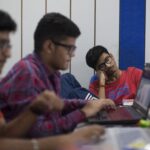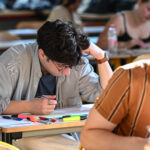
An undergraduate degree no longer carries the cachet it once did; today’s university students have to do more to prepare for the future work. What are some of the 21st-century skills that will put them in good stead? One academic notes that critical thinking, adaptability and working with data are some areas worth honing. With the right learning experiences both in and out of the classroom, they can harness these skills.
Students need to be “globally adaptive” in the future of work and learn to work with colleagues from around the world, according to the Hong Kong University of Science and Technology (HKUST) Director of Undergraduate Recruitment and Admissions Professor Emily Nason. During a recent online interview session with Malaysian media organised by HKUST, Professor Nason said experiences such as undergraduate research, internships and student exchange programmes can contribute to the overall development of university students and enhance their employment prospects.
A complex economy calls for a greater skill set for the future of work

Professor Nason opined that students need to be “globally adaptive” in the future of work. Source: HKUST
To prepare for the future of work, students need to look past the idea that university is a mere rite of passage for academic knowledge. Instead, they should think about what universities can offer to prepare them for a constantly changing labour market. HKUST exchange programmes, for example, bring people from different cultures and backgrounds together. Students also learn to adapt to new environments, find themselves and become independent.
Many of her students who participated in exchange programmes come back more confident, Professor Nason said. They self-manage, self-care and solve problems better. It’s essential that students equip themselves with skills and confidence that would help them to handle the unknown when they leave the safe confines of the university, Professor Nason said.
Undergraduate research is a “valuable opportunity” for students
Students not interested in a career in academia or research may brush off opportunities for undergraduate research, but they do so at their expense. The experience can provide transferable skills — like critical thinking and how to use data — that they can use across a wide range of careers. “I think that is crucially important in many different kinds of jobs — to break down a problem and think about how you can use data to test different hypotheses,” said Professor Nason. “These types of skills — evidence-based, data-based thinking — would be very helpful for students. So I think this is a very rare and valuable opportunity for undergraduate students to be involved in research projects,” she said.










